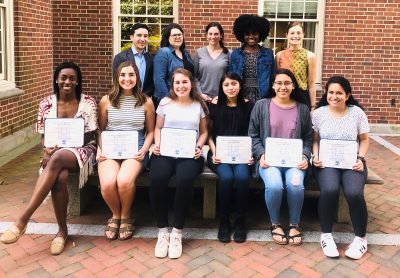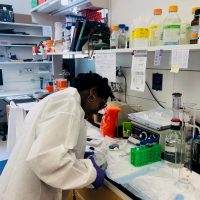Undergraduate Research Opportunities Program
About
The IEHS Undergraduate Research Opportunity Program (UROP) provides structured research activities for undergraduate students interested in environmental health solutions. We strive to provide opportunities to any undergraduate students interested in environmental health solutions research; however, we specifically encourage applicants from groups that are historically underrepresented in STEM fields. We aim to foster diversity and inclusion, as well as provide a foundational research training experience. No research experience is required, as many of our past students have joined the program both with and without prior research experience.
Opportunities Provided by UROP:

First UROP Award Ceremony
- Cultivation of partnerships between undergraduates and faculty/research mentors who share similar research and career interests.
- Practical “hands-on” training in lab safety, formulating research questions, development of research methods, and data analysis.
- Guidance in applying to graduate programs.
- Building meaningful connections in the scientific community through poster presentations and/or attending conferences.
- Disseminate real-world environmental health solutions through manuscript preparation and submission.
How does the program work?
The UROP comprises three components including an academic course offered in the spring semester, two summer internship opportunities, and continued mentorship/research activities year-round. Ideally, students should register for the academic course prior to, or in conjunction with, starting environmental health solutions research.
Academic Course
ENVR 240
Students interested in environmental health solutions research should enroll in the ENVR 240 course in the spring semester. This 1-credit hour course provides a structured introduction to environmental health research. Lectures provide an overview of subjects in environmental health including environmental epidemiology, toxicology, and systems biology research, as well as an introduction to key research skills and an opportunity to engage in other research endeavors. We encourage students to register for this course, as it is a space specifically for students to get exposed to current environmental health research at UNC. This course also aims to facilitate the application and transition into summer opportunities.
We understand that scheduling conflicts may arise: if you are unable to enroll in ENVR 240 but are still interested in participating in UROP, please feel free to reach out to IEHS Director of Training and Mentorship, Dr. Lauren Eaves.
Summer Internship Opportunities
Our summer internship programs are currently accepting applications until February 29th 2024. Please apply here.
FIRE
The Folt Internship Researching Environmental Health (FIRE) is a paid summer research internship for students to gain experience within an IEHS laboratory. Depending on availability, these opportunities can include research that focuses on metabolic health, perinatal health, respiratory health, or cancer survivors’ health. FIRE interns work directly with graduate student mentors and IEHS faculty to address innovative research questions.

UROP student, Jasmine Akoto, learns how to detect proteins by Western Blot
The FIRE internship is named after UNC’s former Chancellor Carol Folt, a leader in environmental health research, and provides students with hands-on laboratory-based and computational-based research in Environmental Health.
QUEST
The Equity and Environmental Justice Program (QUEST) internship is a paid summer experience for undergraduate students interested in environmental justice-based research. The QUEST interns work directly with graduate student mentors and IEHS faculty to perform research dedicated to solutions that promote environmental justice.
Both our FIRE and QUEST summer internship programs partner with other programs at UNC-Chapel Hill including the UNC McNair Scholars Program and UNC Chancellor’s Science Scholars program to recruit and support students who are BIPOC and/or historically underrepresented in science and engineering fields.
Continued undergraduate research in environmental health solutions
The IEHS strives to provide interested undergraduate researchers with continued opportunities and mentorship throughout the semester. Many students continue their research experience after participating in summer internships. Opportunities include research for credit, research toward an honors thesis, scientific conference attendance and research poster presentations, contributions to peer-reviewed publications, mentorship for graduate and medical school applications, and more.
